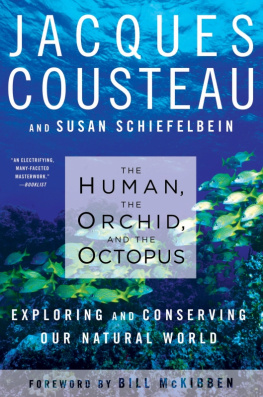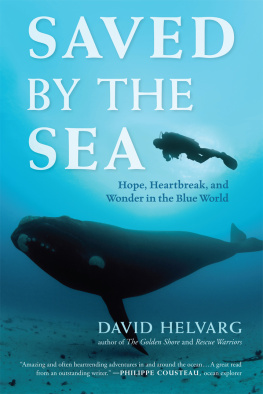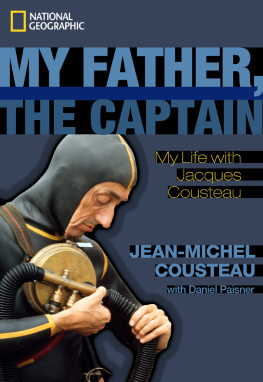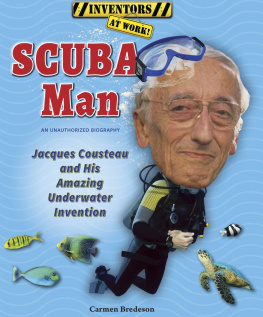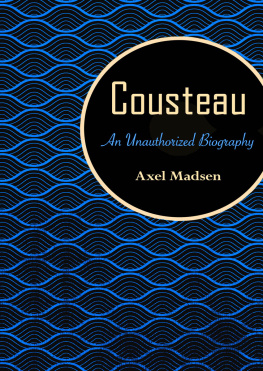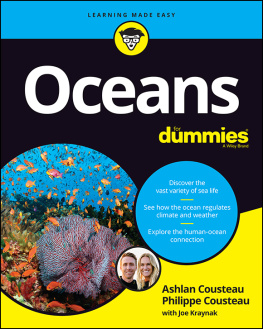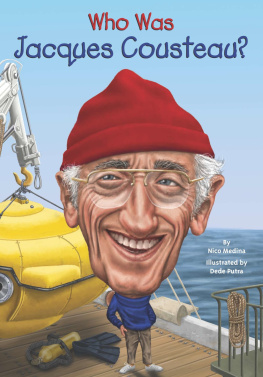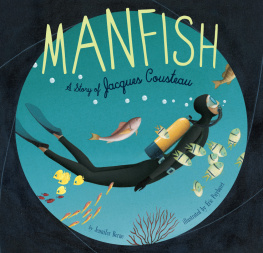THE HUMAN, THE ORCHID,
AND THE OCTOPUS
EXPLORING AND CONSERVING OUR NATURAL WORLD
Jacques Cousteau
AND SUSAN SCHIEFELBEIN
BLOOMSBURY
CONTENTS
... I am a part of all that I have met;
Yet all experience is an arch wherethro
Gleams that untravelld world whose margin fades
For ever and forever when I move...
...........................
The lights begin to twinkle from the rocks;
The long day wanes: the slow moon climbs: the deep
Moans round with many voices. Come, my friends,
Tis not too late to seek a newer world...
Ulysses
ALFRED, LORD TENNYSON
By Bill McKibben
F OR those of us who came of age in the 1960s or 70s, the picture of Jacques Cousteau is fixed forever in our minds. A slight but wiry man, yellow tank peeking over his shoulder, falling backward off the stern of the good ship Calypso as he prepared for yet another dive down among the rays or the jellyfish or the sea cows or the parrot fish down, literally, into his world, the undersea world of Jacques Cousteau. His voice became just as familiar, with its somehow slightly wistful but still infectious Gallic intonation. In ze wisdom of ze dolphins lies ze test of human wisdom. He was as commanding a media persona as Walt Disney (who had his own fantastical world); there were very few foreigners that Americans viewed with more complete trust and admiration.
And why not? As this rich new book reminds us, he was utterly trustworthy, a figure, like Rachel Carson, moved by no desire deeper than to appreciate the world around him, to share that love, and thus to protect it. He was the quintessential explorerbut whereas most great explorers come equipped with a kind of maniacal drive that allows them to scale huge mountains or beat their way across untracked jungle (and also to fight endlessly about who got there first), there was always something more peaceful about Cousteau. Maybe it was a lifetime of swimming off coral reefsthat most enchanted corner of Gods brain, where the animals seem hardly to notice that youre there, and barely bother to get out of your way. The places and creatures he showed us might be dangerous at times, but mostly his world was benign, often sun-dappled, incredibly attractive.
Not only that, but it was brand new. These were the days before many people went scuba diving (partly because Cousteau had just gotten around to inventing much of the necessary equipment). Since were terrestrial creatures, and since you usually cant see very far down into the oceans, they were for most of us a kind of blankour sense of them came largely from what you pulled up with a net from their depths, or what washed up on the beach. Neil Armstrong may have taken us to the moon, but the journey Cousteau took us on was very nearly as shocking.
And much more important. Because as we were slowly starting to realize, the timeless sea, like everything else on Earth, was under assault. Cousteau arrived on the American scene at the first great ecological momentwhen Silent Spring and David Brower and the burning Cuyahoga River and the first Earth Day were all combining to make us aware that the planet was fragile, and that whats more we were breaking it. The oceans had always seemed unfathomably (pun intended) vast. Indeed, generations of engineers had learned the catechism The solution to pollution is dilution and taken it as a license to dump stuff beneath the waves. But all of a sudden that stuff was starting to change life underseas in profound ways. Cousteau and his team found evidence of toxic contamination in many of the places where they dived, and evidence too of overdevelopment and overfishing.
Cousteau divided his career, therefore, between two tasks, equally necessary: getting people to marvel at the beauty of the oceans, and then pointing out how we were destroying them. It was as if the earliest explorer of the North American continent was simultaneously cataloging its vast buffalo herds and watching them die, or if the earliest trips up the Amazon were uncovering the diversity of wildlife while also watching large-scale clear-cutting. No explorer has ever been faced with quite such a dilemma, and Cousteau handled it superbly.
On the one hand he was toughthe same steeliness that made him effective on behalf of the Resistance during the war made him a man to reckon with on matters environmental. (The tale of his confrontation with de Gaulle over the French nuclear program is by itself worth the price of the book.) He was willing to confront scientists who didnt stand up for the seas they studied, and fishing tycoons, and navies. But on the other hand he was seductivehe gave people the chance to feel at home in a beautiful and mysterious world, and the chance to help safeguard it. Someone once said of the American nature writer John Burroughs that he had, with his hiking tales, launched a thousand backpacks. Cousteau launched a million pairs of flippers, and many thousands of activist careers.
Whether those activists will succeed in saving the world he opened to our view is very much an unanswered question. When he died in 1997, the greatest threats to our marine ecosystems were only beginning to heave into view. Global warming, for instance, now threatens to destroy all the earths coral reefs before the century is outthe small animal that creates the reef cant survive outside a fairly narrow band of temperatures. Meanwhile, great heat-spawned storms like Katrina endanger coastlines, and the inexorable rise in sea level seems destined to wreck many of the ocean-fringing marshes and wetlands that are the seas biological batteries. In the past year or two, scientists have begun to warn of an even more profound danger. The same carbon dioxide warming the atmosphere has begun to dramatically alter the pH of the seas, in ways that marine life simply may not be able to cope with. We face not just a silent spring but an empty ocean.
If we are to meet those challenges, a healthy dose of fear will serve as one motivator. Cousteau was insistent throughout his life that this was a water planetthat the thing that made Earth distinctive was its vast liquid seas, against which our more familiar terra firma was in some sense mere backdrop. We came from the seas, and without them our survival was impossible.
But fear is the second-best motivator. Love tops it, and love is what Cousteau specialized in. Of all the people who lived inside our television sets in the early decades of the screen age, none was more purely in love with the planet than Jacques Cousteau. He took us places wed never been before and shared their overwhelming beauty. He set us on a great adventure. We can only hope well prove equal to his challenge.
By Susan Schiefelbein
I D been traveling upriver on the Amazon for about a week when Jacques-Yves Cousteau suggested that I leave his ship Calypso to join a land team driving into the interior. Hed asked me to write the narration for a documentary he was producing on the Amazon basin, and he wanted me to accompany his men across Brazil to its border with Bolivia, where impoverished villagers were attempting to dive for gold buried in the bottom sands of one of the rivers tributaries. His men and I clambered into a truck and set off onto a highway that was in fact nothing more than a dirt road into the rain forest. The trail became ever more narrow as the undergrowth around us became more dense. After proceeding for hours deep into the jungle, the driver suddenly stopped. We jumped down from the truck and instantly understood our dilemma. A massive tree lay prone across the trail ahead. Even lying on its side, it came up to our waists. None of us spoke. Wed all heard a story about Yanomamo Indians who had reputedly killed a busload of tourists for having trespassed on tribal territory via a so-called highway like ours. The tree before us had obviously been felled intentionally. It was a warning. No question of trying to move it and continue on. The men had to find a way somehow to turn the truck around on the narrow trail and get out. As we stood in silence, the thick foliage on one side of the path parted. A brown-skinned man stepped out. His eyes settled on me, the only woman. He pointed to my heart. In the same split second that I realized I was wearing a Cousteau Society T-shirt, he burst into a broad grin and sang outin EnglishJacques Cousteau! Way to go!
Next page
